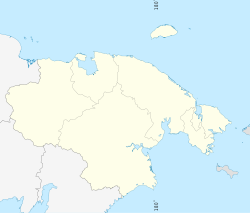Vankarem
| Vankarem (English) Ванкарем (Russian) Ванкареман (Chukchi) |
|
|---|---|
| - Rural locality - Selo |
|
 View of Vankarem village |
|
 Location of Chukotka Autonomous Okrug in Russia |
|
|
|
|
|
|
|
| Administrative status (as of June 2009) | |
| Country | Russia |
| Federal subject | Chukotka Autonomous Okrug |
| Administrative district | Iultinsky District |
| Municipal status (as of June 2009) | |
| Municipal district | Iultinsky Municipal District |
| Rural settlement | Vankarem Rural Settlement |
| Administrative center of | Vankarem Rural Settlement |
| Statistics | |
| Population (2010 Census) | 184 inhabitants |
| Population (January 2016 est.) | 166 inhabitants |
| Time zone | PETT (UTC+12:00) |
| Postal code(s) | 689210 |
| Dialing code(s) | +7 42734 |
Vankarem (Russian: Ванкарем; Chukchi: Ванкареман) is a village (selo) in Iultinsky District of Chukotka Autonomous Okrug, in the Far Eastern Federal District of Russia, situated on Cape Vankarem on the coast of the Chukchi Sea. Population: 184 (2010 Census); Municipally, Vankarem is subordinated to Iultinsky Municipal District and incorporated as Vankarem Rural Settlement.
It is largely inhabited by indigenous Chukchi and Siberian Yupik people and has a population according to the most recent census results of 184, of whom 98 were male and 86 female, a reduction on an estimate made in 2006 of 210 people.
The origins of the name of the settlement are disputed. Some people believe that the name is associated with the traditional beliefs commonly held by indigenous Asian Arctic peoples which equate sea creatures closely with humans and that the name comes from the Chukchi word "Vankaremen" meaning Tusk People, as indigenous hunters referred to their prey as "Walrus People".
Other sources think that the name means "Temporarily Abandoned Bone Dwellings", a thought which has arisen due to puzzlement over the precise history of the settlement. The Chukchi who arrived in the area in the eighteenth and nineteenth centuries found well preserved homes built by a culture which they had previously not encountered and about which they knew nothing, and it is speculated that the settlement might have been abandoned because the previous inhabitants died from some form of epidemic. Indeed, Adolf Erik Nordenskiöld's expedition in the 1870s found a number of recently abandoned houses in the nearby village of Ryrkaypiy which were full of ivory carvings.
...
Wikipedia

